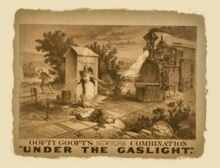Thanks again to The University of New Brunswick I continue to enjoy peeking into the past to follow Lizzie May’s first big season as an actress. As a soubrette in William Nannary’s troupe, Lizzie May was part of the extremely popular production of Aristophanes’ The Clouds .
The dramatic season at the Academy of Music lasted 11 weeks. The popular Clouds was followed by New Men and Old Acres, My Mother-In-Law and many others.
Audiences were soon entranced by the company’s production of Under The Gaslight. Under the Gaslight written in 1867, is such a fantastic example of the melodramatic plays of the day. The story reads like a soap opera… Laura Cortlandt is jilted by her lover, Capt. Ray Trafford when he discovers she is merely an adopted daughter (the scandal!) and actually of mere humble parentage. Laura in shame runs away from home but is dragged into court, where the villainous Byke claims that she is actually his child and so is given custody of her. He attempts to take poor Laura to New Jersey but is stopped by a one‐armed ex‐soldier named Snorkey (you can’t make this stuff up!), and the dashing Captain Trafford. In the ensuing tussle, Byke throws Laura into the river, but she somehow swims to safety and returns to the family who adopted her. It gets even better. The furious Byke then decides to rob the Cortlandt home. Snorkey overhears his plans, but then the evil Byke catches him and ties him to the railroad tracks (!) knowing that an express train will soon pass by and crush him! Laura out for a walk just happens to see Snorkey tied there and releases him moments before the train comes. She then returns home to live happily after ever with the handsome Captain Trafford.
Apparently the famous railroad scene that thrilled audiences was said to have been borrowed by an English play written a few years before called The Engineer. Later, the hero or heroine tied to the train tracks became a staple of early cinema.
Daly’s play is famous for introducing the cliched “thrill” device…offering one sublime, extremely realistic wow moment such as a fire rescue, a volcano erupting, a shipwreck etc… These so-called “sensation plays” were used by many theatre companies to draw in the crowds.
Whether Lizzie May played the lead is not clear but I think she would have made a wonderful Laura.

